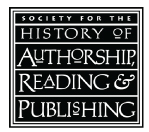Whitney Trettien
Election
Position
Name
Whitney Trettien
Candidate statement
Whitney Trettien. Assistant Professor, Department of English, University of Pennsylvania.
SHARP has been a part of my professional identity since I started forming one. I joined the listserv as a second-year graduate student in 2011; one of my first conference papers was given at SHARP 2013 in Philadelphia. Now, as an assistant professor at the University of Pennsylvania, I teach courses on “Cultures of the Book” and “The Digital Lives of Books,” in which students investigate a wide array of text technologies, from palm leaf manuscripts and incunables to the TRS-80 microcomputer. In short, everything about my research and teaching touches on SHARP. As a member of the SHARP Board, I would look to diversify and expand the Society’s membership 1) through our affiliate panels, which could serve as better outreach mechanisms; 2) our bursaries, which are not, in my experience, well advertised among a broad audience of emerging scholars; 3) strengthening our connections with other societies in digital humanities and public humanities, like HASTAC (Humanities, Arts, Science, and Technology Alliance and Collaboratory); and 4) expanding the SHARP Diversity page. SHARP is a global network of scholars working on questions pointedly relevant today — namely, how humans record, share, and store knowledge with each other. I would welcome the opportunity to make the importance and pertinency of our work known more broadly.
SHARP has been a part of my professional identity since I started forming one. I joined the listserv as a second-year graduate student in 2011; one of my first conference papers was given at SHARP 2013 in Philadelphia. Now, as an assistant professor at the University of Pennsylvania, I teach courses on “Cultures of the Book” and “The Digital Lives of Books,” in which students investigate a wide array of text technologies, from palm leaf manuscripts and incunables to the TRS-80 microcomputer. In short, everything about my research and teaching touches on SHARP. As a member of the SHARP Board, I would look to diversify and expand the Society’s membership 1) through our affiliate panels, which could serve as better outreach mechanisms; 2) our bursaries, which are not, in my experience, well advertised among a broad audience of emerging scholars; 3) strengthening our connections with other societies in digital humanities and public humanities, like HASTAC (Humanities, Arts, Science, and Technology Alliance and Collaboratory); and 4) expanding the SHARP Diversity page. SHARP is a global network of scholars working on questions pointedly relevant today — namely, how humans record, share, and store knowledge with each other. I would welcome the opportunity to make the importance and pertinency of our work known more broadly.
